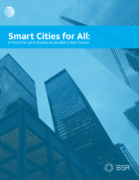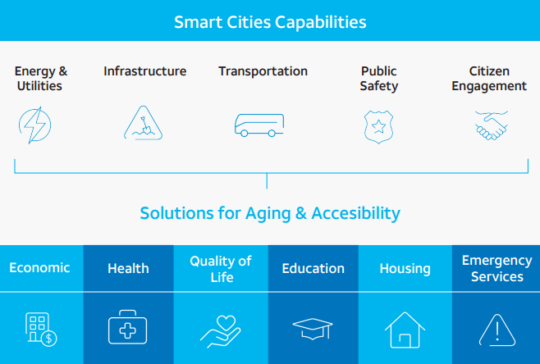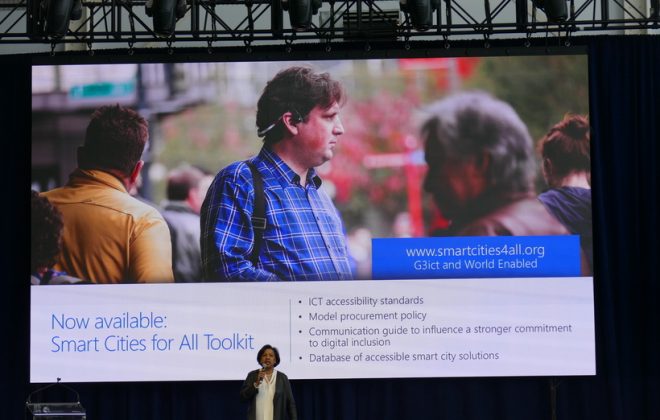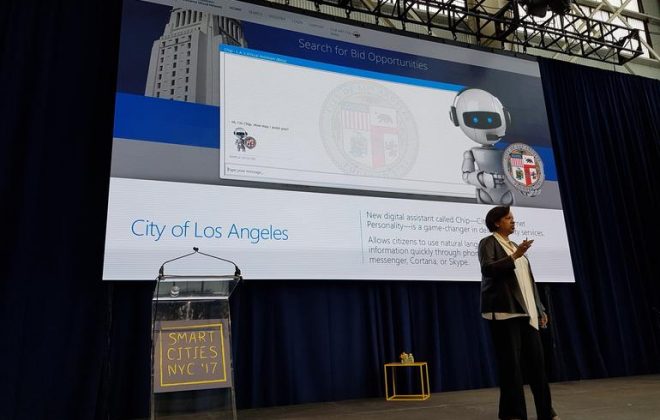White Paper – Smart Cities for All: A Vision for an Inclusive, Accessible Urban Future
By Panagiotis Tsarchopoulos on 19 June 2017. Posted in Intelligent / Smart Cities Solutions
 AT&T, in collaboration with Business for Social Responsibility, G3ict and World Enabled, launched a new white paper — Smart Cities for All: A Vision for an Inclusive, Accessible Urban Future. The report aims to highlight the potential for smart city technology to enable benefits for people who are aging and people who are living with disabilities, and to indicate suggested practices for building more inclusive smart cities. The report focuses on North America, though it includes global examples and technologies.
AT&T, in collaboration with Business for Social Responsibility, G3ict and World Enabled, launched a new white paper — Smart Cities for All: A Vision for an Inclusive, Accessible Urban Future. The report aims to highlight the potential for smart city technology to enable benefits for people who are aging and people who are living with disabilities, and to indicate suggested practices for building more inclusive smart cities. The report focuses on North America, though it includes global examples and technologies.
The paper maps the opportunities for smart city technologies to benefit all communities, as well as the keys to success to ensure these technologies advance more equitable and positive outcomes for people who are aging and people living with disabilities The applications included are not meant to be exhaustive or universal; rather, they represent a selection of current smart city technologies that are advancing benefits for the aging and persons with disabilities.
Smart city technologies will fundamentally alter city infrastructure and the ways city services are deployed. As these technologies are only now being tested and implemented, city officials will now have a critical opportunity to ensure the considerations of aging communities and communities living with disabilities are respected from the outset.

The report identifies four keys to success it recommends city officials use to ensure digital inclusion:
- Design for Inclusion: To quote the guiding principles of a recent framework for state governments: “Disability is a natural part of the human experience that in no way diminishes one’s right to fully participate in all aspects of community life” Universal Design and protections against privacy abuses should be front and center as cities consider deploying these technologies. Universal Design criteria will ensure technologies are usable by all citizens. Additionally, there are opportunities for cities to embed smart city solutions that will leapfrog barriers to adoption. Enhanced digital security and privacy protections will be a fundamental requirement as these new technologies will play a vital role in the lives of citizens – and may be directly responsible for the health and wellbeing of the most vulnerable communities. With proper planning, system designs for smart city infrastructure can ideally detect security concerns and have alerting and remediation capabilities for the broader public.
- Engage Partners and Stakeholders: Smart city technologies must adopt a multi-stakeholder engagement process to ensure sustainable financing of these innovations and citizens’ full participation in any projects. Partnerships with the private sector will help co-create cost-effective and viable solutions that leverage companies’ expertise in designing for inclusivity. Engaging aging communities and those living with disabilities in the planning of smart cities is critical to ensuring these solutions align with citizen needs and expectations.
- Promote Adoption of Technology: City officials must work to bridge the digital divide that often prevents people who are aging or living with disabilities to access the full benefits of technology. Officials must work to empower these communities to participate in smart cities by increasing access both to broadband connectivity and connected devices, as well as the necessary technology education to fully utilize these benefits. Without
addressing these issues, cities risk perpetuating disparities that keep these communities from accessing smart technologies. - Foster the Entrepreneur Ecosystem: Many of the applications and solutions that will benefit these communities will arise from social entrepreneurs and innovators of all ages. Beyond enhancing the accessibility of city infrastructure and services, a key role for city government is to enable this social innovation to flourish and direct entrepreneurship to benefit these communities. Publicly funded incubators and open data portals are some of the many ways city governments can foster citizen solutions.
Content retrieved from: http://www.urenio.org/2017/06/19/white-paper-smart-cities-vision-inclusive-accessible-urban-future/.
Upcoming Events
There are no upcoming events.




